Have you ever been at a kids’ soccer game when it had to be cancelled by lightning? The kids don’t like it, not one bit. They are out there having fun, and then some grown up shuts down the game. Winning or losing, it doesn’t matter, they just want to play. Even the players on the team losing 8 – 0 complain, as if they were just about to launch a giant nine-goal rally with 10 minutes left to play.
Well, some ETF investors likely feel like those soccer kids this week, as several ETFs were officially terminated this week. Horizons Funds closed its silver inverse fund, the gold inverse fund, the long gold/short silver fund, the long silver/short gold fund, and the 30-year Bond Bull Plus fund. The GMP Oil and Gas Fund is set to close in August. Investors will get paid out full net asset values at the time of closing, minus any applicable fees and expenses. Investors may not like it, but closings are just part of the ETF game. Sometimes, funds are simply not economic. Occasionally, funds are launched to take advantage of investor demand, but then that demand fades away quickly and an ETF is left with a product that is simply not selling. Even with the low fees typically associated with ETFs, a smaller fund will feel the impact of fees more than a larger fund (due to administration fees and other expenses divided over a smaller base).
In addition, very small funds can be detrimental to investors because their bid-ask spread in the market tends to be high, and liquidity—by default—tends to be very low. One thing that is interesting about ETF closings is that—generally—no shareholder vote is required. We went through the prospectuses of many ETF companies (not all—there are far too many) and every one we found indicated that management companies could terminate an ETF “at their discretion”. With mutual funds closings, on the contrary, a unit holder vote is typically required before a fund can be closed. In the mutual fund world, though, funds are almost never ‘closed’; instead they are merged with other existing funds. Investors get a say on the merger, and end up with units in the continuing fund.
The continuing fund gets to spread administration fees over a larger asset base, resulting in a lower MER than otherwise. Despite the previous comments, however, National Bank this week announced the termination of four Nxt Funds (Income and Growth, Balanced, Balanced Growth, and Short Term Income). Occasionally, ETFs will merge also. However, for most ETFs, there is often a problem because many ETFs are so specialized in one particular investment area.
Under investment regulations, to merge an ETF into another ETF they both need to have similar investment objectives. With a specialized fund like a gold/silver spread fund, for example, it is next-to-impossible to find a fund that is similar enough to satisfy regulators. We have heard from some disgruntled ETF investors, who are not happy with their funds’ closing. Perhaps they have been ‘averaging down’ on their holdings, in order to earn greater profits when the sector or fund they are trading decides to move up again.
We understand their frustration, but, having come from the mutual fund world, we know it is just not economic sometimes to keep a fund running. With mutual funds, you generally need $25 million in assets or so to really make a fund even remotely economic. Paying a fund manager, independent investment review committees, trustees etc. all adds up, and fund mergers usually make sense when funds fall below this asset level. Of course, most mutual funds are not nearly as specialized as some ETFs, so mergers into similar funds are often easier to execute. ETFs, by design, have lower fees, so the economic asset threshold is much lower. There are plenty of funds out there that have less than $10 million in assets.
As the ETF industry continues to grow, ETF closings will become a way of life. Of note, if you feel you absolutely must go ultra short the Mexico market, you may not have much time left to buy SMK, with just $1.9 million in assets. Or, if North American financials don’t cause you enough pain yet, try FEFN, the MSCI Far East Financials ETF, with $2.2 million in assets; or, maybe there is still some time to finally profit from global warming: GWO, an exchange-traded note linked to the Credit Suisse global warming index, is still open, with $2.8 million in assets. We are just kidding of course. These three almost never trade, have not been stellar performers, and their closings can’t be too far away.





Comments
Login to post a comment.